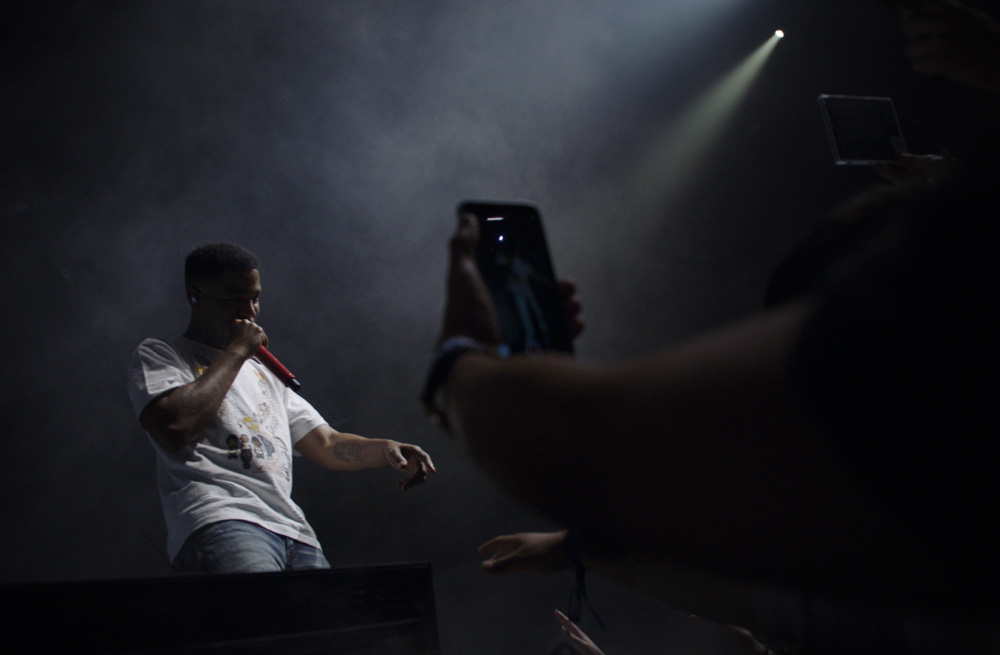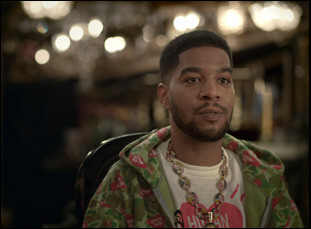For an artist who surprised his collaborators by bringing up such musical influences as the Electric Light Orchestra and the Crash Test Dummies when they thought they were putting together a rap album, Robert Alexander knew that making a film about Kid Cudi was going to have to look different than any other portrait of a musician you’ve seen. Not that this was intimidating for the filmmaker and photographer, but instead an opportunity to show off some of his own artistry as someone who has been unusually gifted at getting celebrities to let their guard down before his lens on such series as HBO’s “The Shop” and “More Than an Athlete” and getting at the root of why they’re worthy of being celebrated in the first place.
In the case of Cudi, or Scott Mescudi by birth, it wasn’t so much a question of Alexander getting inside the artist’s head when so much of his work has been confessional, with his candor in integrating his struggles with depression and addiction on his albums making even more beloved to fans who first found him online with the backing of a major label with “Day ’n’ Nite.” Instead, Alexander had to figure out how to articulate how Cudi opened up the minds of so many others as he found success and grappled with its repercussions, both good and bad, as he went from playing small clubs in Australia to headlining arenas. “A Man Named Scott” involves legions of bold-faced names from Kanye West to Timothee Chalamet as well as those waiting for their turn in the limelight, but while they’re there to talk about Cudi, the director engages them in a greater conversation about balancing the need to do meaningful personal work with the demands of the greater culture, taking unusual avenues away from its central subject when having other artists speak to what he does with their own craft and performances rather than words.
It’s telling that Cudi doesn’t make his own appearance in “A Man Named Scott” until after a few of his collaborators on his breakthrough album “Man on the Moon” do, with their interviews stacked in such a way that you can feel the momentum that would carry him further than any one album and the film allows Cudi to take his rightful place as a guiding light while allowing everyone’s contributions to his career to shine and burn brightly individually. With “A Man Named Scott” dropping on Amazon Prime, Alexander spoke of how he was able to stay true to the artist while making something uniquely of his own and getting his often media-savvy subjects comfortable with giving more than soundbites.
The brand Complex has an incredible relationship with Kid Cudi for years and they reached out to me and it was coming up on the 10th anniversary of “Man on the Moon” and “Day N’ Nite,” and they asked if I wanted to direct something around his first album. I had always understood Cudi as more than a great musician, but a cultural icon because of who he was as far as being the cool guy who made self-expression stylish and on trend — to talk about all your emotions in an environment where that was never done. He made it something that was worthwhile, so when I was asked to be involved in this, I was incredibly excited not just to be able to dive into his musical journey, but his journey as a person who creates something, who gives away so much of himself and [wanted to ask] what is that result over time, especially trying to come back and do something new. Like you gave so much of yourself and people embraced it, but then people just wanted more of that from you, so who are you as a person when you say, “Well, I want to do something different. How am I going to make sure that’s embraced and what’s the push and pull of that?”
It sounds like you were always intent on telling a larger story than some retrospective piece on “Man on the Moon” or even staying exclusive to his body of work. Was the idea there from the start to tell a story of what it’s like to be an artist right now?
Yeah, as a filmmaker, it’s incredibly important for me to be entertained in what I’m doing and I think that was incredibly limiting to just look at his first album. The impact he’s had on other artists and kids, he had such a huge hand in where we are musically now, I wanted to look at that as an exploration and as much as I need to be entertained, I need the artist to be entertained on that journey, so I had to convince him of that and together, the biggest argument for us expanding and going beyond this is that we want the audience to feel that. We want the audience to look at this and say I can connect with him and this is amazing motivation for me to continue to be myself and to continue to express my art in the way that’s the most honest for me. So at its heart, that’s the message of the film.
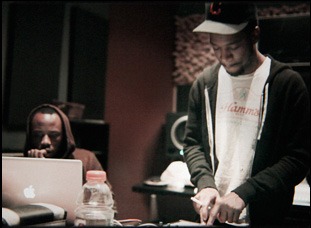
Well, we’re all human and we’re all very different and I really work very hard at finding an honest connection with anyone I get to sit and communicate with. With [people like] Kanye, there are certain things I’m excited to talk to him about, just being a fan and there’s things that he’s excited to talk about, just because of where he’s at in his life, so it’s important when I sit down and [think] what’s the best use of his time for all parties, what’s going to be the most honest real conversation that I can have that’s going to be engaging to you. Trying to steer someone in one direction or another, it doesn’t work. What does work is saying, “Well, we’re here right now, and I clearly have an agenda in making this film, but I’m excited about creativity,“ so that was the basis of everything we explored and then it’s like, what’s the best path in for that?
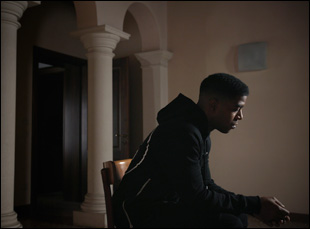
That came over time. There was the idea that I just wanted to have a really important human connection, exploration, and conversation with Cudi and it starts there and then it just evolves. There’s moments I was expecting us to spend way more time on, but we didn’t. There were things I never thought we would talk about, but we do and then it’s about what’s the best thing for the film and over the course of that, I started to see this clear path of how his approach shifted creatively when he went into years and into albums, so that became a really clear marker for how we can define different eras in his journey.
And when you watch certain things or you have a conversation with someone, certain things just come up over the course of it. The film was broken up [into two shoots] – I had two real big conversations with Cudi – one was in Tokyo and one was in Italy and the Tokyo one, he sat down as the artist. He sat down as Kid Cudi, [where it’s like] “Let me turn on the charm, let me turn on my superstar appeal and let me be the artist.” And over the course of that conversation, I started to see the clear separation between the artist and the man. Through that, he was willing to just be so much more honest with me and it was this beautiful surprise and also this motivation that as I go through the journey of talking to all these different people and then coming back to Cudi, [I thought] how much more honest and how much more depth can we get to? And he was incredibly giving in that.
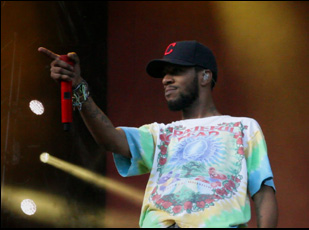
Yeah, there was no visual to reflect some of the things we talk about in the film and for me, it’s important that the emotion comes through in audio as well as it comes through as a visual element, so I wrote a performance piece that for me just further articulates some elements in the film [where] we had this great dialogue, but I didn’t have a great visual that was worthy enough for the dialogue, so I connected with Jaden and asked if he would come for a day and perform it for us. He did and it was great.
What was it like showing Scott a cut of this for the first time?
It was definitely nerve-wracking because he was incredibly supportive in letting me make the film in the way I thought was best and he came and watched one cut with me in person, only one time. He gave very, very few notes. He had a couple specific things that were important to him, but other than that, he was incredibly kind and supportive and trusting to let me tell this the way I felt it should be told. I haven’t seen the final film with him yet in person, but he was so sweet. He called me just a couple weeks ago and said he watched the final, and it was the first time he had watched it not just with his producer hat on, but as himself. He was very, very happy with it and incredibly proud, and he talked about how emotional he was to watch it and he was really appreciative. To me, that was the ultimate reward for working on this.




